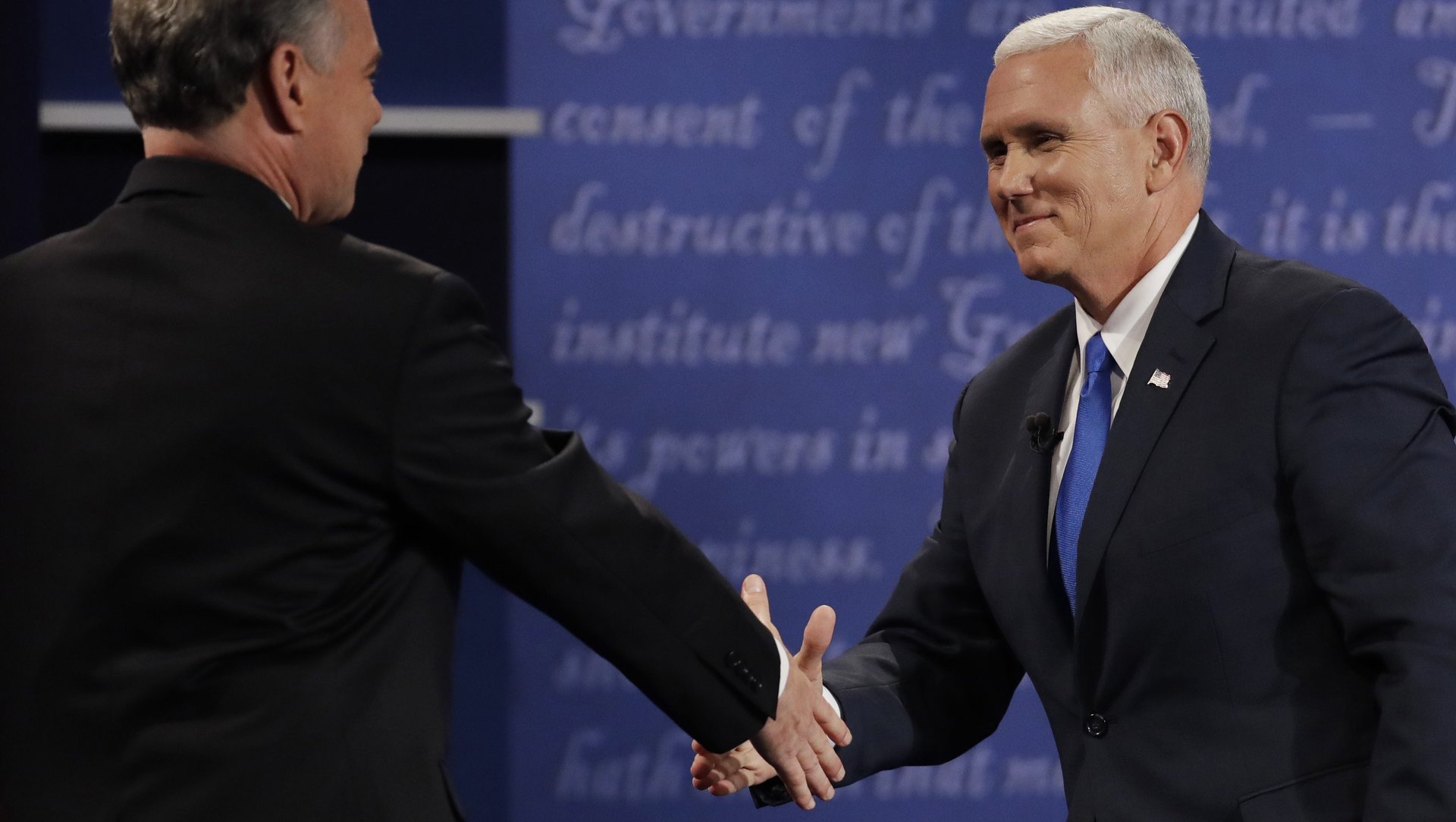Mike Pence is the presidential candidate Republicans wish they had
By this point, Americans (and everyone else) following the US presidential race should be able to count on one thing at least: the Republican candidate’s temperament.


By this point, Americans (and everyone else) following the US presidential race should be able to count on one thing at least: the Republican candidate’s temperament.
He calls it “winning,” and his “strongest asset”—but many seem to disagree: Donald Trump is routinely perceived as arrogant, and a bully, and his behavior confirms such perception. In the debates, he displays a perfectly sexist, micro-aggressive behavior. In his off time, he takes to Twitter to rant. And when he is not aggressive he is inappropriate or outright offensive: to women, disabled people, immigrants—you name it.
It’s a type of behavior that may indeed have served him well for a while, one stunt after another carrying his candidacy forward, but as the elections near, his behavior is costing him some of the support of his party—including high-profile Republicans and normally conservative publications, which just cannot see him as “presidential.”
Enter Mike Pence.
Trump’s running mate turned in a debate performance last night (Oct. 4) that was mostly poised, pretty calm, generally polite. The experienced congressman and governor talked tough against Russia, needled Democrats on economic conditions for working-class Americans, and spoke eloquently about the role his faith plays in his stance on issues like abortion rights (which he opposes). In short, he was the politician many Republicans no doubt wish were running atop the ticket instead of Trump.
The difference in tone between Pence and Trump was evident from the very beginning of their respective debates. On Sept. 26, during his presidential debate with Hillary Clinton, Trump was asked the first question by NBC’s Lester Holt. Here’s how Trump opened things:
Thank you, Lester. Our jobs are fleeing the country. They’re going to Mexico.
Pence, on the other hand, before rebutting Kaine’s first answer with this own, took time for some manners:
Well, first off, thank you, Elaine, and thank you to—thank you to Norwood University for their wonderful hospitality and the Commission on Presidential Debates. It’s deeply humbling for me to be here, to be surrounded by my—my wonderful family.
And, senator Kaine, it’s an honor to be here with you, as well.
It set the conversation off on a civilized note, and though manners soon gave way to interruptions (Kaine) and head-shaking (Pence), Pence maintained a demeanor so remarkably different from Trump’s that it managed to make even the most controversial things he said (like suggesting some kind of ban on Syrians entering the country) seem somehow more acceptable. During the debate, he even openly professed his respect for Kaine’s personal pro-life and religious views.
Trump set the bar very low, of course. But from this perspective, Pence looked far more presidential than the actual candidate to become president.
Trump, meanwhile, was on Twitter having a hell of a time, live-tweeting the debate with an unsurprising mix of tweets and retweets insulting Kaine’s looks, posting in all caps, and pronouncing Pence the winner. He sent out a total of 47 tweets in 90 minutes—maybe a few too many to pay attention to what was being said, which is another of the problems often found with Trump.
Many have suggested Pence used this debate to set up his own candidacy for 2020, and many more have wished for the top and bottom halves of the Republican ticket to be reversed. For the time being, neither is happening. But if nothing else, Pence used the debate to show, as conservative pundit Kayleigh McEnany said on CNN’s post-debate coverage, that “Donald Trump had the judgement to pick Mike Pence.” If he had that judgement to do that, he may have some more, somewhere. The question is whether voters—the elusive undecideds, especially—will have more chances to see evidence of it before Nov. 8.